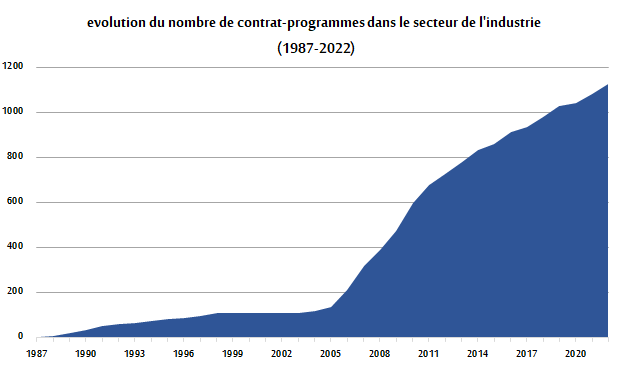Energy Efficiency Program in the Industrial Sector

In 2021, the industrial sector was the third largest energy-consuming sector in Tunisia, accounting for more than 25% of final energy consumption (2079 ktoe). Energy efficiency is, therefore, an unavoidable path to reduce the energy consumption of this sector and a refuge for companies to reduce their energy bill and consequently their production costs.
Aware of the role of energy efficiency in improving the competitiveness of Tunisian industry, the Tunisian State has, since the late 1980s, initiated the implementation of support programs for carrying out energy efficiency actions.
The initial focus was on large energy consumers, but since 2004, the effort has broadened, and the pace of implementation has significantly increased thanks to various reforms undertaken by the State.
These reforms include the enactment of the Energy Management Law No. 2004-72, the creation of the Energy Management Fund in 2005, and the establishment of appropriate financing mechanisms.
Since the start of this program in the late 1980s and until the end of 2022, 1,127 investment projects in the field of energy efficiency and natural gas substitution in the various branches of activity of the industrial sector have benefited from the advantages granted by the State.
The achievements of the Energy Efficiency Program in Industry for the period 2004-2022 are as follows:
- The investment volume according to commitments : 647.17 MDT
- The investment volume achieved : 77 MDT
- FNME and FTE premiums committed for the period 2005-2022 : 19.88 MDT
- Cumulative projected energy savings (2004-2022) : 1208 ktoe
Strategy, goals, and directions
 The industrial sector is among the largest energy consumers in Tunisia. It ranks second, after the transportation sector, in terms of final energy consumption and consumption of petroleum products, with 30% and 20% respectively. Indeed, the energy efficiency measures implemented since the 1990s and the improvement of industrial processes through new technologies have greatly increased the mobility of people and goods. Consequently, the transportation sector, mainly road transport, has become the leading energy consumer in recent years.
The industrial sector is among the largest energy consumers in Tunisia. It ranks second, after the transportation sector, in terms of final energy consumption and consumption of petroleum products, with 30% and 20% respectively. Indeed, the energy efficiency measures implemented since the 1990s and the improvement of industrial processes through new technologies have greatly increased the mobility of people and goods. Consequently, the transportation sector, mainly road transport, has become the leading energy consumer in recent years.
On the other hand, the industrial sector represents a strong potential for energy savings which could reach 32% by 2030, i.e. 7% more than for the transport sector.
To achieve this goal, the Energy Transition Fund’s intervention in this sector is focused on supporting companies in the energy audit process on the one hand, and assisting companies in the process of prior consultation on the other hand.
The FTE also conducts support actions for industrial companies for the study and implementation of cogeneration projects. It also assists them in the certification process in Energy Management System – EnMS – according to the ISO50001 standard.
Furthermore, the ETF ensures the development of integrated financing solutions for energy efficiency projects in the industrial sector through the mobilization of dedicated funding lines.
